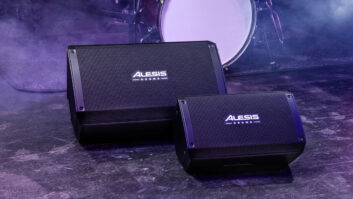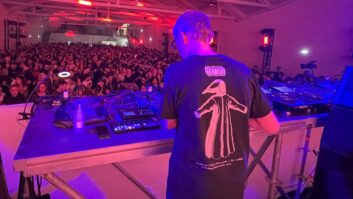
Editor’s Note: This article originally appeared on TechRadar.
After an almost 40-year hiatus, Kodak Super 8 is back. Yes, the makers who popularized the cinema film format have finally brought to market a new Super 8 Camera enhanced for the digital world, after the project was first unveiled at CES in 2016.
I’ll bet the new Kodak Super 8 Camera spikes plenty of interest – it’s simply not the kind of tech we see hit the shelves in 2023. And for many in the industry, including all-time great movie directors Steven Spielberg, Christopher Nolan, Patty Jenkins and Steven McQueen, Super 8 is cinema. There’s even a movie, Super 8, dedicated to the romance of the format. I loved it.
To paraphrase some of their words, “(Super 8) made me fall in love with cinematic storytelling”, “It taught me how precious an image is and can be” and “There’s always a sense of discovery with the format”.

We’re now in a digital film world, so where does Super 8 fit in? From a product development perspective, naturally, any new-to-market traditional film camera needs to evolve. Kodak has rolled out key upgrades in its 21st century Super 8 Camera, including a 4-inch vari-angle LCD screen and ‘Extended Gate’ video recording. However, it’s also an incredibly expensive bit of gear, above and beyond the projected list price when it was first unveiled in 2016, and pricier than some of the best mirrorless cameras for any budget.
A new Super 8
On the outside, the Kodak Super 8 Camera is pretty familiar, with a boxy form factor, C-mount interchangeable lens (it comes with a 6mm 1:1.2 lens which is a full-frame equivalent 35mm lens approximately, and will work with any C-Mount lens), plus pistol grip and top handle. However, it’s also radically different.
There’s a 4-inch LCD vari-angle screen to compose your shots and allow you for the first time to see aspect ratios using an overlay, navigate menus, and see camera settings. It’ll record audio via a 3.5mm input onto an SD card (and you can monitor audio levels on the LCD). You’re not fixed to a 16:9 aspect ratio either, with ‘Extended Gate’ recording through an 11% larger frame that includes 14:9 ratio, so your output can better fit modern displays. These are features we take for granted in today’s digital cameras, but it’s all new for the Super 8 format. This is Super 8 made easy.

Sadly there’s oversight, too, namely the use of a micro USB port for charging. From 2024, there will be an EU standard for all phones, tablets, and cameras to use USB-C connectors, and not micro USB. This could prove a problem should Kodak wish to roll out its Super 8 Camera to a wider market.
Overall, this is an exciting upgraded and enhanced Super 8 experience… at a cost.
The price of nostalgia
The Kodak Super 8 Camera will launch first in the US, costing $5,495. When it was first announced in 2016, the projected cost was between $400 and $750. Clearly, there’s more going on than inflation.
In the picture below there’s what’s inside the pelicase; camera, 6mm lens, pistol grip, a Kodak Tri-X film cartridge, plus accessories. Each cartridge contains 50 ft of motion picture film, which is equivalent to around three minutes of record time, depending on frame rate – the Super 8mm Camera can shoot at 24 and 25fps, plus over and under crank at 18 and 36fps, another exciting new feature.
There are plans to make the camera available in other countries, and you can register your interest on the Kodak website via the Sign To Buy option.

Comments about the new Super 8 Camera range from inspired to dismissive. Ultimately, there’s no getting around just how expensive it is, as someone noted on a camera forum, “the price of nostalgia”. At $5,500 without factoring in the cost of film and if you need to pay for it to be developed, this feels like an exclusive product, banking on being different enough in 2023 for people to consider it. After all, it’s pricier than most of the very best video cameras today.
Romantics will say that there’s something about Super 8 that can’t be replicated digitally – you have to try it. The new camera also somewhat modernizes the shooting experience of the much-loved film format. However, the world has also moved on. Can Kodak justify such a high cost? I’d love to give the Kodak Super 8mm Camera a spin, but with the price hike, something tells me I’ll never get the chance.
About the Author
Tim Coleman is the Cameras editor at TechRadar. He has enjoyed more than 15 years in the photo video industry with most of those in the world of tech journalism. During his time as Deputy Technical Editor with Amateur Photographer, as a freelancer and consequently editor at Tech Radar, Tim has developed a deep technical knowledge and practical experience with cameras, educating others through news, reviews and features. He’s also worked in video production for Studio 44 with clients including Canon and volunteers his spare time to consult a non-profit, diverse stories team based in Nairobi. Tim is curious, a keen creative, avid footballer and runner, and a moderate flat white drinker who has lived in Kenya and believes we have much to enjoy and learn from each other.
See also: Interpret: Smart Clothing May One Day Replace Smartwatches And Smartphones













